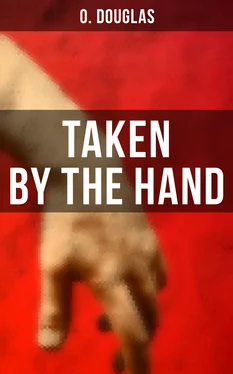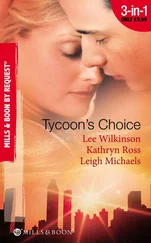O. Douglas

Books
OK Publishing, 2020
musaicumbooks@okpublishing.infoTous droits réservés.
EAN 4064066397517
CHAPTER I
CHAPTER II
CHAPTER III
CHAPTER IV
CHAPTER V
CHAPTER VI
CHAPTER VII
CHAPTER VIII
CHAPTER IX
CHAPTER X
CHAPTER XI
CHAPTER XII
CHAPTER XIII
CHAPTER XIV
CHAPTER XV
CHAPTER XVI
CHAPTER XVII
CHAPTER XVIII
CHAPTER XIX
CHAPTER XX
CHAPTER XXI
CHAPTER XXII
CHAPTER XXIII
CHAPTER XXIV
CHAPTER XXV
CHAPTER XXVI
CHAPTER XXVII
CHAPTER XXVIII
CHAPTER XXIX
CHAPTER XXX
CHAPTER XXXI
CHAPTER XXXII
CHAPTER XXXIII
CHAPTER XXXIV
CHAPTER XXXV
TO
CLEMENT BRYCE GUNN
FOR NEARLY FIFTY YEARS DOCTOR OF MEDICINE
IN THE TOWN OF PEEBLES
“Those who must journey
Henceforward alone
Have need of stout convoy
Now Great Heart is gone.”
The characters in this book are entirely imaginary, and have no relation to any living person
Table of Contents
“ Finish, good lady: the bright day is done . . .”
Antony and Cleopatra.
Two ladies stood on the doorstep of 14 Park Place, Glasgow. They had not been asked into the house—had not, indeed, expected to be; they were there merely to enquire. First they had parleyed with a maid, then a nurse passing through the hall had been brought to speak to them, and now, satisfied that they had heard all they could hear, they were withdrawing. They were both a little more than middle-aged, stout, comfortable-looking women, obviously well-to-do, with Persian-lamb coats, expensive handbags, and hats of the type known as “matrons” set high on their heads.
In silence they came down the handsome flight of steps from No. 14 and only began to talk when they had got well away from the house.
“Dear, dear,” said Mrs. Murray, the older and the stouter of the two. “Poor Mrs. Dobie! Who would have thought it? Such a healthy woman and so full of life. I don’t think I ever met anyone more ‘on the spot’ as they say. It was a treat to see her get things into shape at a bazaar or anything like that. Just the way she turned herself—so purpose-like. Of course, as a minister’s daughter you may say she was brought up to that sort of thing, but still . . .”
“I’m awfully sorry,” said the younger woman, with a note of genuine feeling in her voice. After a pause she went on: “She was Janie Boyd. I was at school with her, and a wild girl she was, minister’s daughter or no minister’s daughter! The pranks she used to play! And her father such a saint! I’m sure St. Luke’s thought the world of him.”
“Not only St. Luke’s but the whole of Glasgow. He was a good man. . . . Wasn’t Mr. Dobie an elder in St. Luke’s, Mrs. Lithgow?”
“He was. D’you not remember him? A tall man with a beard. His first wife was a Duthie. She had a lot of money. I expect it all went to her only child—Samuel, Sir Samuel now. . . . Mr. Dobie would be sixty when he married again, and Janie Boyd wouldn’t be very young either, thirty-five, mebbe. I never knew why she married him, he was so like a waxwork, and a beard and all, and fussy wasn’t the word. Peggy would tell me that waxworks aren’t fussy, but, well, you know what I mean. But, anyway, Janie seemed quite happy with him. It was wonderful how she managed to keep him contented, and yet get her own way in everything that mattered. But since he died—it must be ten years ago! Fancy!—and she had all the money at her disposal—she’s come out wonderfully. I’d hardly have given her credit for so much organising power. How many things is she president of, I wonder? And it’s always a pleasure to see her on a platform. She not only speaks well but she looks well. I always wondered where she got her hats; they’re so becoming. She’ll be greatly missed. I’m sorry for Be’trice, poor thing.”
“Yes,” said Mrs. Murray mournfully, “it’s Be’trice who’s to be pitied. . . . She’s a friend of your Peggy’s, isn’t she?”
“Oh, well, they played together as children, and the two families have always been intimate, but I wouldn’t call them great friends. To tell you the truth, Mrs. Murray, Peggy can’t be bothered much with Be’trice; she says she’s too deprecating . Did you ever? I’m sure if she is it’s a good fault, for most of the girls I know are impudent hussies. I said that to Peggy, but she just laughed. . . . I like Be’trice because she’s so civil, it’s a relief to find a girl pretty-mannered in these days, but perhaps she is a little inclined to be listless and—and unenterprising. She never seems to want to do anything but stay at home beside her mother.”
“Mebbe,” said Mrs. Murray, panting a little with the walk, “mebbe the girl’s shy.”
Mrs. Lithgow turned to give a beaming bow to a passing acquaintance, then said: “Have you noticed, Mrs. Murray, that a very energetic mother has often a tired kind of daughter? Just as a very sort of diplomatic mother will have a disconcertingly honest girl?”
The older woman laughed. “I daresay you’re right. Well, anyway, you’ve got a very satisfactory daughter in Peggy. So clever in the house and yet so good at games, and a fine, upstanding creature! I’m sure you and her father must be proud of her.”
“Oh, we are. I don’t deny it. She’s a good girl, Peggy. And what d’you think? She’s just got engaged! It’s not out, but I’m telling you because you’ve always been so kind about Peggy. Harry Lendrum. Yes, Aitkin & Lendrum. The eldest son. Yes, isn’t it nice? ‘A neighbour’s bairn’ as Granny says; they’ve grown up together. And I’ll have her beside me—that’s the best of it. I hope I wouldn’t have made a fuss, but I’d have been very vexed to let her away to India or Kenya or any of those places—though she’d go like a shot. Nothing dauntons our Peggy. . . . You’re tired, Mrs. Murray: I hope you haven’t walked too far?”
“No, no. I’m just a—wee thing—wheezy. I walk too little. Indeed, Mr. Murray sometimes tells me I’ll soon lose the use of my legs! That’s the worst of a car. I’m awfully pleased to hear about Peggy. I wonder what she’d like for a present?”
“Oh, anything will be acceptable. They’ve got to furnish from the foundation, so to speak.”
“That’s fine. If it’s a widower with a house furnished already, or a bride going abroad, you feel so cramped in your choice, don’t you? We’ll have to think of something specially nice for Peggy. . . . It won’t be for a time yet?”
“In the beginning of the year, we thought, but there’s nothing fixed. Well, here we are at your own door, and I do hope you haven’t felt the walk too far.”
“It’s done me good, Mrs. Lithgow. Now you’ll just come in and have a cup of tea with me. You’re a good wee bit from home yet.”
“Thank you, Mrs. Murray. I’ll be glad of my tea, for I’ve got a great blow this afternoon. Poor Janie Dobie. I can’t get over it at all.”
They went in together, through the hall, up the handsome staircase, to the large and richly furnished drawing-room, where a tea-table stood invitingly near the fire.
Tea was brought up at once, and Mrs. Murray, busying herself at the tea-tray, sighed. “Dear, dear, it seems no time since poor Mrs. Dobie was sitting in that chair you’re in. . . . She always admired that fire-screen, and I said ‘I’ll leave it to you in my will, Mrs. Dobie,’ just for a joke you know. How little I thought. . . . How d’you like your tea, Mrs. Lithgow?”
Читать дальше













